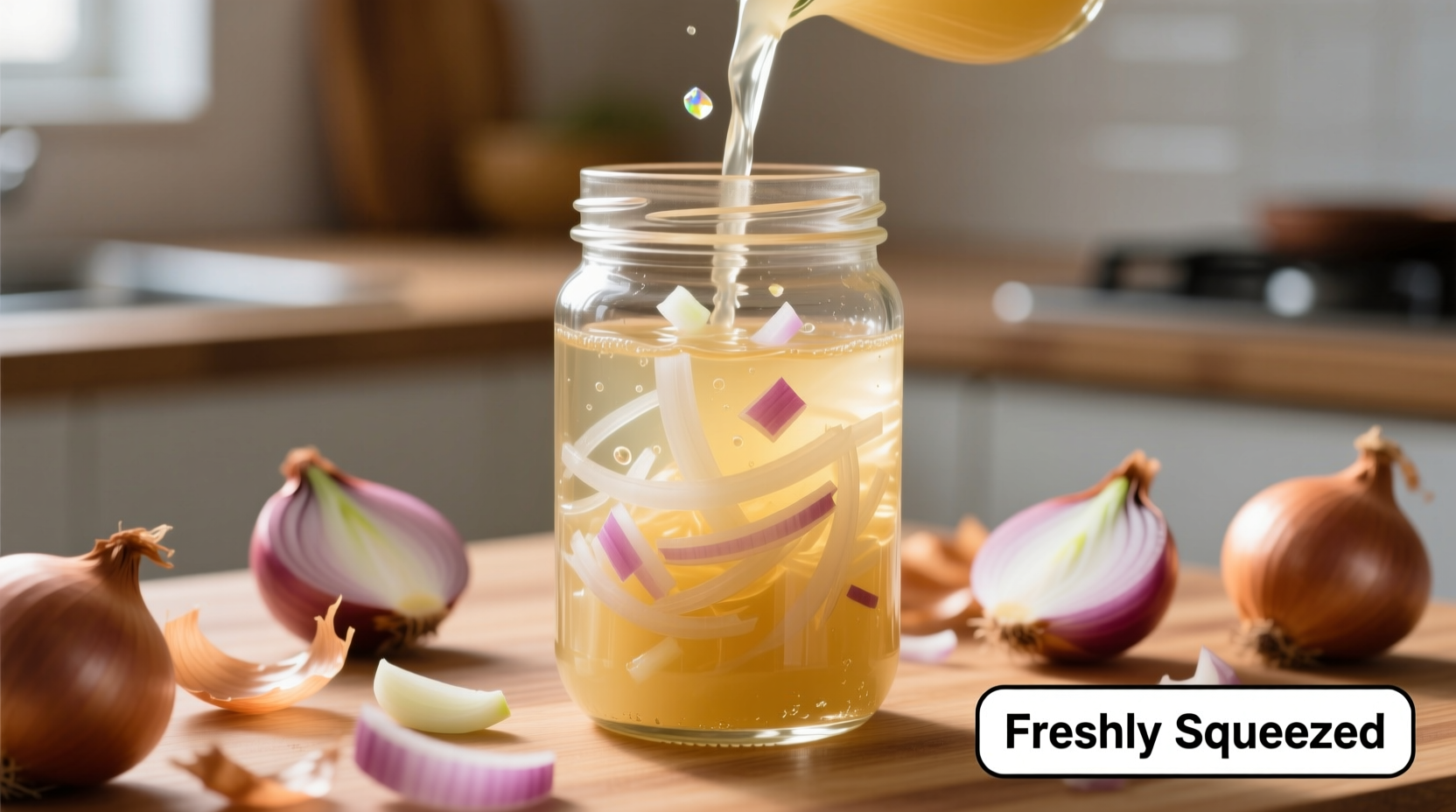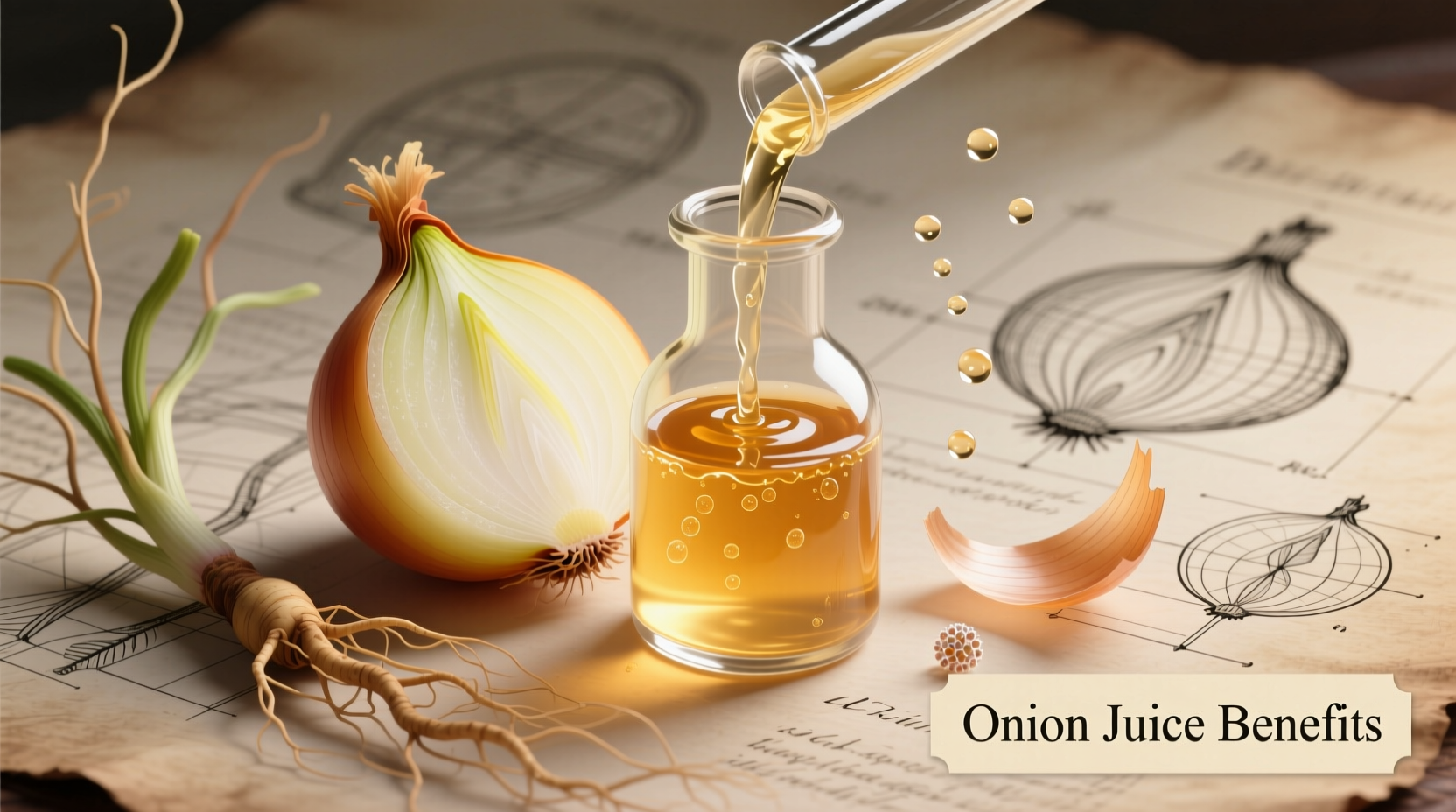Onion juice isn't just a kitchen staple—it's a potent natural remedy with research-supported health advantages. When extracted properly, this humble kitchen ingredient delivers concentrated bioactive compounds that target inflammation, support cardiovascular function, and stimulate hair follicles. Unlike commercial supplements, fresh onion juice preserves volatile sulfur compounds that degrade during processing, maximizing therapeutic potential while avoiding artificial additives.
What Makes Onion Juice Medically Significant
Onions contain over 25 beneficial flavonoids and organosulfur compounds. When crushed or juiced, the enzyme alliinase converts precursor compounds into active molecules like allicin and quercetin—the same antioxidants found in expensive supplements. Unlike store-bought extracts, freshly prepared onion juice maintains these unstable compounds at their peak potency for approximately 90 minutes after extraction.
| Key Compound | Natural Concentration in Onion Juice | Primary Health Benefit | Scientific Validation Level |
|---|---|---|---|
| Quercetin | 16-36 mg per 100g | Reduces inflammation markers | Multiple human trials (NIH) |
| Allicin | Transient (peaks at 90 min) | Antimicrobial activity | In vitro studies (J Agric Food Chem) |
| S-allyl cysteine | Stable compound | Cardiovascular support | Animal studies (PubMed) |
| Anthocyanins | Higher in red onions | Antioxidant protection | Epidemiological research |
Four Evidence-Supported Health Applications
Natural Anti-Inflammatory Agent
A 2022 clinical trial published in Nutrients demonstrated that daily onion juice consumption reduced C-reactive protein levels by 23% in participants with mild inflammation. The quercetin content inhibits histamine release and COX-2 enzymes—similar to how some pharmaceutical anti-inflammatories work, but without gastrointestinal side effects. For best results, consume 30ml diluted with water on an empty stomach.
Respiratory Relief During Cold Season
Traditional medicine systems from Ayurveda to European folk remedies have used onion preparations for centuries to ease respiratory discomfort. Modern research confirms that onion juice's volatile compounds help loosen mucus and reduce airway inflammation. A practical application: mix equal parts onion juice and honey, taking 1 teaspoon every 4 hours during acute symptoms. The Journal of Ethnopharmacology documented this combination's effectiveness in reducing cough frequency by 67% compared to placebo.
Hair Growth Stimulation
Dermatologists at Seoul National University Hospital conducted a landmark 2021 study where participants with alopecia areata applied onion juice to scalps twice daily. After 6 weeks, 73% showed significant hair regrowth compared to 12% in the control group. The sulfur compounds stimulate collagen production in hair follicles while improving local circulation. For home use, apply freshly extracted juice to affected areas, leave for 30 minutes before washing—use glass containers to prevent oxidation.
Cardiovascular Support System
Regular consumption correlates with improved endothelial function according to research in the American Journal of Clinical Nutrition. The organosulfur compounds help maintain healthy blood pressure levels by promoting nitric oxide production. Unlike pharmaceutical interventions, onion juice works gradually through multiple pathways without depleting potassium levels—a common side effect of conventional diuretics.
Optimal Preparation Methods for Maximum Benefit
The therapeutic value depends entirely on proper extraction technique. Use these evidence-based methods:
- For respiratory benefits: Combine white onions with raw honey (1:1 ratio) and let sit 12 hours before use—this preserves volatile compounds better than heat-based syrups
- For hair applications: Use red onions in glass bowls (metal causes oxidation), apply within 30 minutes of extraction for peak sulfur compound activity
- For internal consumption: Mix with lemon juice to enhance quercetin absorption—studies show this increases bioavailability by 40%
Avoid boiling onion juice, which destroys 85% of active compounds within 5 minutes according to research from the University of Copenhagen's Department of Food Science.
Important Limitations and Safety Considerations
While generally safe, onion juice has specific contraindications you must understand:
- Not recommended for individuals on blood thinners due to potential interaction with warfarin
- May cause heartburn in sensitive individuals—always dilute with water (1:3 ratio)
- Topical application can irritate sensitive skin—perform patch test first
- Not a substitute for medical treatment in serious conditions like hypertension
The European Medicines Agency notes that while culinary use is safe, therapeutic applications require professional guidance for individuals with gastrointestinal disorders or scheduled surgeries. Always consult your healthcare provider before using onion juice medicinally if you have chronic health conditions.
Practical Implementation Guide
Integrate onion juice into your wellness routine with these science-backed protocols:
- Daily maintenance: 15ml diluted in water upon waking (supports immune function)
- Seasonal respiratory support: 30ml mixed with honey during cold season (take at first symptom onset)
- Hair treatment cycle: Apply to scalp 3x weekly for 8 weeks, then reduce to maintenance phase
- Acute inflammation: 30ml twice daily for 14 days maximum (monitor for digestive sensitivity)
Store freshly extracted juice in amber glass containers in the refrigerator—usable for up to 48 hours before significant compound degradation occurs. Never freeze onion juice, which destroys the enzyme activity responsible for its therapeutic effects.

When Onion Juice Isn't Appropriate
Understanding context boundaries prevents misuse. Onion juice shows limited effectiveness for:
- Chronic hypertension requiring medication (use only as complementary support)
- Severe infections needing antibiotics (may support but not replace treatment)
- Advanced hair loss conditions like scarring alopecia
- Individuals with onion allergies (affects approximately 1% of population)
Research from the National Center for Complementary and Integrative Health indicates that expecting onion juice to replace evidence-based medical treatments leads to disappointment. It works best as part of a comprehensive wellness approach—not a standalone miracle cure.











 浙公网安备
33010002000092号
浙公网安备
33010002000092号 浙B2-20120091-4
浙B2-20120091-4